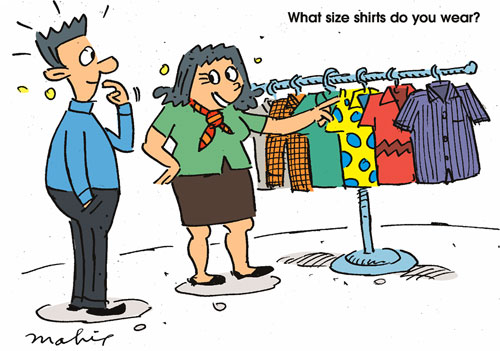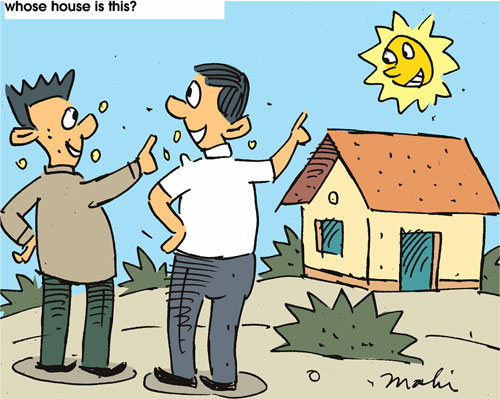|

by R. S. Karunaratne
All about question words
Question words, also known as ‘Wh - words’ or interrogation words are
normally used at the beginning of a question. In speech a question word
alone can be used as a question. However, this is not done in written
English.
The question words are as follows: who, whom, whose, what, which,
where, when, why and how.
Every question word must have a finite verb.

[Who]
‘Who’ can be used as the subject or object of a verb. It is used for
people, not things.
Who is your favourite author?
Who broke the window?
Who wrote Romeo and Juliet?
Who is coming with me? Who will win the election?
[Whom]
‘Whom’ is used as the subject or object of a verb or preposition.
Whom do you want to speak to?
In modern English most speakers prefer to use ‘who’ instead of ‘whom’
in questions.
Who did you invite for your birthday party?
Who did you go out with yesterday?
“With whom did you go out yesterday?” sounds rather unnatural.
[Whose ]
We use ‘whose’ in questions when asking about which person owns or is
responsible for something.
Whose is this bicycle?
Whose pen is this?
Whose handwriting is this?
Whose camera are you going to use?
Whose rooms are these?
[What ]
We use ‘what’ to ask for information about people or things.
What time is it?
What books do you read?
What are you going to wear for the party?
What size shirts do you wear?
What happened yesterday?
‘What’ can be used to ask about the reason for doing something.
What are these logs for?
What are you doing that for?
A: We need a bigger refrigerator.
B: What for?

When ‘what’ is used in a main clause to ask a question, remember to
put the verb before the subject.
What are you doing now?
When ‘what’ is used in a subordinate clause, we do not put the verb
before the subject.
I want to know what you are doing for a living.
[Which ]
We use ‘which’ in a question when there is a limited set of answers
or possibilities.
Which shirt would you like to wear?
Which doctor did you consult?
A: He came with his friend.
B: Which one? He has several.
We use ‘which’ to add extra information to a previous clause.
I read three novels last week, the first of which is really
fascinating.
If the question is about a choice between a number of things, use
‘what’ not ‘which.’
What is your favourite subject?
[Where ]
We use ‘where’ when we wish to know ‘in what place.’
Where are you going?
Where did I put my glasses?
Where’s the meeting being held?
Where did you put my dictionary?
When we use ‘where’ in a main clause to ask a question, we use the
verb before the subject.
Where is the nearest railway station?
When we use ‘where’ in a subordinate clause, we do not put the verb
before the subject.
I don’t know where the nearest railway station is.
[When ]
‘When’ means ‘at what time’ or ‘at the time at which.’
When are you leaving for England?
When is he coming again?
When do you expect the results? When is the funeral?
When are they going to London?
We use the present tense when we talk about something happening in
the future.
Give this letter when you meet him tomorrow.
If you are not certain whether something will happen in the future,
use ‘if’.
It is good for health if you walk to school everyday.
[Why ]
‘Why’ means ‘for what reason.’
Why did you come here without going to school?
Why are you running?
Why is jogging good for health?
Why are they late?
Why are you following me?
[How ]
‘How’ means ‘in what way’ or ‘by what methods.’
How did you get so much of money?
How does this machine work?
How can you be so stupid?
How are you feeling?
How was your recent trip to Italy?
Know your idioms
English is particularly rich in idioms. They are modes of expressions
peculiar to the language. However, idioms frequently defy logical and
grammatical rules. Therefore, you have to be familiar with idioms. Here
is an interesting quiz on idioms. Tick off the meanings for the idioms
in bold type and check your answers with the key.
1. I think it’s all up with the passengers who were on the bus when
it plunged down a precipice.
(a) there is no hope for survival
(b) there is hope of survival
(c) there is no news
2. When all is said and done I think you’ll get the job.
(a) According to what they say
(b) according to what they do
(c) considering all the facts
3. We must make allowances for Sam for his absence because he has
some family problems.
(a) excuse
(b) judge less severely
(c) warn
4. I expected to see a small-made woman at the ward but I was
surprised to see an Amazon.
(a) strong, energetic woman
(b) old woman
(c) fat woman
5. When I was stranded in Tokyo a stranger, an angel of mercy,
appeared and offered me a lift to my hotel.
(a) supernatural being
(b) a small girl
(c) somebody who suddenly brings comfort or hope
6. The teacher was angry when the student he was scolding answered
him back.
(a) gave an impertinent answer
(b) answered politely
(c) remained silent
7. You can’t tell him anything, he knows all the answers.
(a) he is a genius
(b) he is too proud of his abilities
(c) he is a fool
8. I would rather recruit you for the vacancy any day than your
friend.
(a) any time you wish
(b) today itself
(c) in any circumstances
9. The snatch-thief took to his heels and ran like anything.
(informal idiom)
(a) energetically
(b) lazily
(c) slowly
10. With his lectures we don’t seem to be getting anywhere in this
course.
(a) feel happy
(b) earn no income
(c) make no progress
[Key]
1. (a) 2. (c) 3. (b) 4. (a) 5. (c) 6. (a) 7. (b) 8. (c) 9. (a) 10.
(c)
Starters:
Uses of the apostrophe
We use the apostrophe ( ‘ ) to show possession or relationship. We
use - ‘s for people.
I stayed at my uncle’s house.
Have you met Bernard’s sister?
Are you going to Lasantha’s birthday party?
Mary is a girl’s name.
Caroline is my mother’s sister.
Sometimes we can use -’s without a noun.

Madhuri’s hair is shorter than Carol’s.
A: whose house is this?
B: It is my father’s.
A: Where were you yesterday?
B: At Fernando’s.
Cyril’s car is bigger than Norman’s.
Namasivayam’s house is smaller than Selvarajah’s.
With plural nouns we use the apostrophe after -s’.
This is my friends’ house.
Write your parents’ names here.
The managers’ quarters are furnished.
The teachers’ rest-room is closed today.
The editors’ conference room is on the first floor.
We normally do not use -’s or -s’ for things and places. Instead we
use ‘of’.
The roof of the house has caved in.
The beginning of the teledrama is boring.
The station master announced the time of the next train to Ragama.
What is the capital of China?
Father opened the front door of the house.
[Activity]
Complete the following sentences with -’s, -s’ or of. Check your
answers with the key.
1. We like ................................................. (the
violin / Nethmi)
..........................................................................................
2. What is ................................................? (the
capital / Malaysia)
..........................................................................................
3. When is ...............................................? (the
birthday / your mother)
..........................................................................................
4. Do you like ...........................................? (the
colour / this sari)
..........................................................................................
5. Write your address at .............................. (the bottom /
the page)
..........................................................................................
6. What is ................................................? (your
teacher / address)
..........................................................................................
7. What was ............................................ ? (the cause
/ the accident)
..........................................................................................
8. .......................... is on the top of a hill. (the house /
my friend)
..........................................................................................
9. .......................... is very good. (spoken English / Sekara)
..........................................................................................
10. For me, the early morning is .................. (the best part /
the day)
..........................................................................................
[Key]
1. We like Nethmi’s violin.
2. What is the capital of Malaysia?
3. When is your mother’s birthday?
4. Do you like the colour of this sari?
5. Write your address at the bottom of the page.
6. What is your teacher’s address?
7. What was the cause of the accident?
8. My friend’s house is on the top of a hill.
9. Sekara’s spoken English is very good.
10. For me, the early morning is the best part of the day.
Quiz on short forms
Contractions or short forms are useful mainly for speech. Here is a
list of short forms used in English. Give the full form against each and
check your answers with the key.
1. aren’t : ......................
2. can’t : ........................
3. couldn’t: ......................
4. daren’t : .................
5. didn’t : ..................
6. doesn’t : ....................
7. don’t : ....................
8. hadn’t : ....................
9. hasn’t : ......................
10. haven’t : ......................
11. he’d : ......................
12. he’ll : ......................
13. he’s : ......................
14. here’s : .......................
15. how’s : ...................
16. I’d : ..................
17. I’ll : ...................
18. I’m : ...................
19. I’ve : ......................
20. isn’t : ...................
21. it’ll : ......................
22. it’s : .....................
23. let’s : ....................
24. mightn’t : .....................
25. mustn’t : ...................
26. needn’t : .....................
27. oughtn’t : .....................
28. shan’t : .....................
29. she’d : ......................
30. she’ll : ..................
31. she’s : ................
32. shouldn’t : ..................
33. that’s : ...................
34. there’d : .................
35. there’ll : .................
36. there’s : ...................
37. they’d : ....................
38. they’ll : ..................
39. they’re : ....................
40. they’ve : ....................
41. wasn’t : ....................
42. we’d : ....................
43. we’ll : ......................
44. we’re : ......................
45. we’ve : ....................
46. weren’t : .....................
47. what’ll : .......................
48. what’s : .....................
49. when’s : .................
50. where’s : .....................
51. who’d : .....................
52. who’ll : .......................
53. who’s : ...................
54. won’t : ........................
55. wouldn’t : ......................
56. you’d : ....................
57. you’ll : ................
58. you’re : ..................
59. you’ve : ......................
[Key]
1. are not 2. cannot 3. could not 4. dare not 5. did not 6. does not
7. do not 8. had not 9. has not 10. have not 11. he had / he would 12.
he will 13. he is / he has 14. here is 15. how is / how has 16. I had /
I would 17. I will / I shall 18. I am 19. I have 20. is not 21. it will
22. it is / it has 23. let us 24. might not 25. must not 26. need not
27. ought not 28. shall not 29. she had / she would 30. she will 31. she
is / she has 32. should not 33. that is / that has 34. there had / there
would 35. there will 36. there is / there has 37. they had / they would
38. they will 39. they are 40. they have 41. was not 42. we had / we
would 43. we wil / shall 44. we are 45. we have 46. were not 47. what
will 48. what is / what has 49. when is 50. where is / where has 51. who
had / who would 52. who will 53. who is / who has 54. will not 55. would
not 56. you had / you would 57. you will 58. you are 59. you have |

